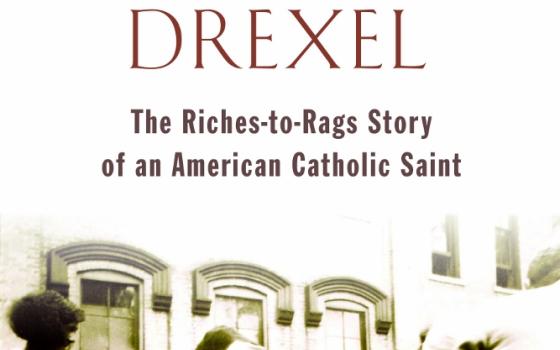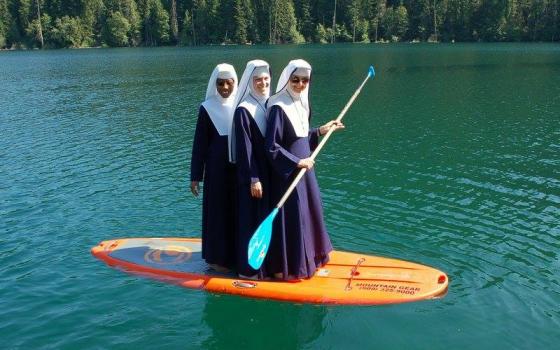Some stories about women religious make the evening news, as one did this week. Some, like the Nuns on the Bus kick-off Wednesday, end up being covered by dozens of news organizations. Some never earn such high profile.
But thanks to a new book written by a college professor in Oklahoma, we now know more about the life of the saintly founder of the Sisters of the Blessed Sacrament.
A “compelling” life
When Saint Katherine Drexel was alive, she found little support within the church for her passion of ministering to “Indians and colored people.”
But there was no mistaking her own convictions when she founded an order of women religious in 1891 and named it Sisters of the Blessed Sacrament for Indians and Colored People. Today, the order is known as the Sisters of the Blessed Sacrament.
If you’re not familiar with Drexel, who was named a saint in 2000 by Pope John Paul II, you need to read Cheryl Hughes’ new book, Katharine Drexel: The Riches-to-Rags Story of an American Catholic Saint.
The Tulsa World this week profiled Hughes and her work, a project that lasted seven years for the humanities and religious studies professor at Tulsa Community College in Oklahoma.
“What originally drew me to her was what she did with her life,” Hughes tells me. “I was fascinated by somebody who gave up her wealth and social standing to devote her life to such a difficult mission. Her cause was most unpopular, yet she carried on in the best way that she knew. Of course, she saw herself doing the Lord’s work by tending to the least of his brothers here in the United States.”
Drexel, who was born in 1858 into a wealthy Philadelphia banking family, founded 130 schools for Native Americans and African-Americans, including 19 in Oklahoma.
Hughes says that she didn’t know about Drexel’s connection to Tulsa – where she founded both a school for Native American girls and a black parish – until she began her book research.
Hughes found Drexel’s “Eucharistic spirituality to be compelling,” she says. “She longed for the Eucharist from a very early age, begging her parents to allow her to take her First Communion at a time when the usual age for the sacrament in the United States was 12.
“It was Jesus in the sacrament who gave her the strength to become a successful missionary. Of course, it also helped that she was very rich. Though, truth be told, she gave over to her order all decisions about how to spend her income from her father’s estate. It was no longer ‘her’ money to spend, but the order’s.”
I asked Hughes to share a favorite anecdote about her subject. She pointed out a trip to Europe that Drexel took in 1886 with her two siblings, during which Drexel had an audience with Pope Leo XIII.
Drexel asked the pope to send priests to Indian missions in the American West. But instead, the Pope asked Drexel: “Why not, my child, become yourself a missionary?”
“I love that the pope was so intuitive about her that he could see her potential as a missionary, years before she became one,” says Hughes.
She sees lessons in Drexel’s life for other women considering a religious life.
“There are many missionary opportunities today for women religious in the U.S. and abroad. An authentic call to the religious life will include the great spiritual strength to sustain it,” says Hughes. “So I think the sincere desire to serve God’s people in this special way is a prerequisite for the religious life.
“The second key is to find an order with a mission one finds absolutely compelling. There are many rewards to being a woman religious, but it is also a demanding life, so one ought to be absolutely sure of the authenticity of the call and the value of the work.”
Hughes’ interest in Drexel didn’t stop with the book. She now performs as Drexel for church and school groups, dressed in a period habit.
“I have to reassure school audiences that I am not Saint Katharine, but Cherie Hughes in costume,” she jokes.
Biden draws big media for Nuns on the Bus
Were there even nuns at the Nuns on the Bus rally in Des Moines this week? If all you read were mainstream media accounts of the kick-off rally on the steps of Iowa’s state capitol, you might think that Vice President Joe Biden was the only speaker worthy of note.
As you know from Dawn Cherie Araujo’s story on GSR, he was the closing act.
On the other hand, Biden, who referred to himself as “a kid who had 12 years of Catholic education,” drew the depth of national media coverage that the event might not otherwise have enjoyed. (Global Sisters Report is providing coverage along the way; Sr. Jan Cebula is on the bus with them through Sunday, and we’ll be getting reports from the NETWORK team for the rest of the tour.)
Along with local media, The New York Times, The Washington Post, ABC News and Associated Press were all there. But national political reporters seem to have gone because of what the AP pointed out:
“Just three days after Hillary Clinton visited the presidential testing grounds of Iowa, Vice President Biden was right behind her with a populist speech that sounded at times like it was 2016. Although this trip was an official White House visit, in Iowa the topic of presidential politics can’t be avoided.”
Our favorite headline from the event came from The Washington Post: “So Joe Biden and a group of nuns walk into a rally . . . .”
Heroes don’t need capes
Sr. Maura Considine in England is being hailed a hero for helping a teenager who was being robbed at gunpoint. The story comes from the Manchester Evening News.
Rebecca Soanes, 16, was walking near her home in Collyhurst when a masked man hit her with a metal bar and told her, “I’m going to kill you if you don’t give me your phone.”
But Considine came to the rescue, leading Rebecca to safety inside a gated car park, and the attacker fled.
“It was a horrible attack but it could have been a lot worse,” said Rebecca’s father, Jeff Soanes. “Honest to God, she is a true savior.”
They can walk on water
A hat tip to Patheos.com for leading us to the photo of the week: Three sisters standing on a paddle board.
The Sisters of Mary, Mother of the Church’s in Spokane, Wash., posted the photo to their Facebook page.
Here’s their caption: “What’s better than seeing a Sister on a paddle board? How about seeing three! Thanks to ‘Mountain Gear Spokane,’ who loaned us a board for our outing this summer, all the Sisters had an opportunity to ‘walk on water!’
“And, thanks to our guardian angels, we did not fall in!”
Couldn’t kick old habits
This, by far, is one of the most interesting stories I’ve read this year about any group of sisters.
Liza Foreman of The Daily Beast recently wrote about the work of Italian textile historian Isabella Campagnol, who has researched a group of renegade sisters in Venice who were true glamor pusses.
We kid you not.
In her book, Forbidden Fashions: Invisible Luxuries in Early Venetian Convents, Campagnol details the lives of these fascinating sisters who lived between the 15th century and mid-18th century.
Many were high-society, noble women forced into religious life to save their families from bankruptcy. But once behind the convent walls the women refused to give up the perks of their lavish lifestyles.
Campagnol’s research led her to detailed descriptions of nuns who were supposed to be wearing floor-length habits but who, instead, wore dresses with corsets that showed their décolletage, high-heeled clogs and silk stockings with gilt lace.
“The higher the heel, the closer to God, right?” wrote Foreman.
Little sisters have lots of fans
They expected 250 people. But when the Little Sisters of the Poor in Baltimore threw an inaugural 5K fundraiser run last weekend more than 800 people showed up.
The Nun Run attracted participants from 71 parishes and 24 schools, according to a story in the Archdiocese of Baltimore’s publication, Catholic Review.
“It’s amazing how many people have supported the sisters from all over,” Marcy Shea-Frank, the Little Sisters of the Poor’s development director, told the publication.
She said she didn’t know whether the big turnout could be attributed to people supporting the sisters in their fight against the federal government over its HHS mandate concerning insurance coverage for birth control.
But, she said, “We hope that this really grows. We hope that this introduces more people to us, and that next year’s run is all that much bigger.”
Stirring the pot
We’ll share this call from the Food Network here with this plea to the cooking channel: Please don’t stereotype women religious.
For one thing, most U.S. sisters don’t wear habits anymore.
The network is looking for sisters who love to cook to appear on an upcoming episode of its popular “Chopped” cooking competition. The winner could walk away with the top prize of $10,000.
The network will hold auditions in Chicago, Miami, Seattle and New York City. To sign up, go to choppedcasting.com.
[Lisa Gutierrez is a reporter in Kansas City, Mo., who scans the non-NCR news every week for interesting pieces about sisters. She can be reached at lisa11gutierrez@gmail.com.]



